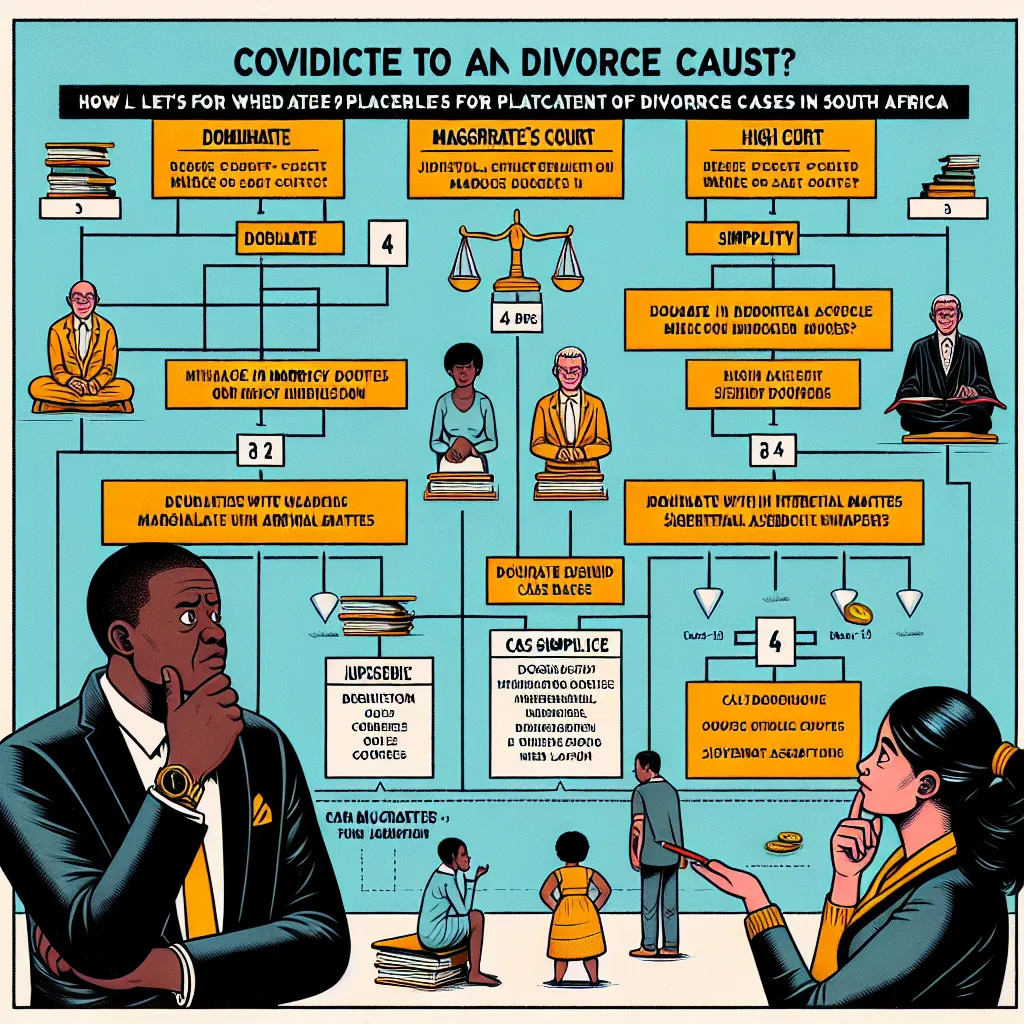Ask AI on The Internet
Question: Read the fictitious scenario and answer the questions that follow: Phillip, a web developer by profession, was recently instructed to design a web page for a well-known law firm in South Africa. He has been married to Melissa for seven years. Phillip meets Jessica at the law firm (his client). Shortly after meeting, Phillip and Jessica become involved in a romantic relationship, and Phillip realises that he no longer wishes to be married to Melissa. He decides to institute divorce proceedings. Philip has approached you, a legal advisor, for legal advice .Phillip needs to select the correct court for his divorce matter. With reference to legislation, discuss the civil jurisdictions of the Magistrate’s Courts and advise Phillip on which court can hear his matter. (9 marks)
In South Africa, the Magistrate’s Courts have specific jurisdictions in civil matters, including divorce. To understand which court Phillip should approach for his divorce proceedings, let's break down the relevant legislative frameworks and jurisdictions. 1. **Magistrate’s Courts Act, 1944 (Act No. 32 of 1944):** - This Act governs the jurisdiction and procedure of the Magistrate’s Courts. - Magistrate’s Courts have two types of jurisdiction: **district** and **regional**. 2. **Divorce Act, 1979 (Act No. 70 of 1979):** - This Act governs the legal procedures and grounds for divorce in South Africa. - It provides that divorce proceedings can be instituted in either the High Court or a Regional Court of the Magistrate’s Court. 3. **Regional Courts' Civil Jurisdiction:** - In 2010, the jurisdiction of Regional Courts was expanded to include civil matters, including divorce (Jurisdiction of Regional Courts Amendment Act, 2008). 4. **District Courts' Civil Jurisdiction:** - District Courts typically handle civil matters with lesser complexity and lower monetary limits, and traditionally did not handle divorce matters until expansions in regional jurisdictions. Given this legislative framework, Phillip essentially has two options: the Regional Court of the Magistrate’s Court or the High Court. However, the High Court can often be more formal and may involve higher costs, making the Regional Court a more favorable (and financially feasible) option for many individuals seeking a divorce. ### Key Points to Consider: - The **Regional Court** can hear divorce matters. This was established to balance the workload between different courts and make justice more accessible. - The court must have jurisdiction over the area where either Phillip or Melissa resides. Phillip needs to approach the court that has jurisdiction in the area where he or Melissa are currently residing. ### Recommended Court: **Regional Court of the Magistrate’s Court** **Reasoning:** - **Accessibility and Cost:** The Regional Court is generally more accessible and cost-effective compared to the High Court. - **Jurisdiction:** The Regional Court has jurisdiction over civil matters, including divorce, as per the Jurisdiction of Regional Courts Amendment Act, 2008. ### Steps Phillip Should Take: 1. **Verify Residency Parameters:** Ensure that either he or Melissa resides within the jurisdiction of the Regional Court he plans to approach. 2. **Filing for Divorce:** File the necessary divorce papers with the Regional Court’s clerk. ### Conclusion: Phillip should file for divorce in the **Regional Court of the Magistrate’s Court** in his or Melissa’s jurisdiction, as it is empowered to hear divorce matters under South African law and provides a cost-effective, accessible option compared to the High Court. This advice aligns with the legislative framework provided by the Magistrate’s Courts Act and the Divorce Act, ensuring Phillip’s proceedings comply with the legal requirements of South African divorce law.
Think your answer is better than the AI's? Post it below.
Other Most Relevant Posts:
 1. Contract Law in South Africa: A Case Study
2. Employment Eligibility of Jane
3. Remedies for Latent Defects
1. Contract Law in South Africa: A Case Study
2. Employment Eligibility of Jane
3. Remedies for Latent Defects
Question Tags
If you want your question answered by an AI, click here.






Post your own comment: